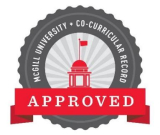Course design: getting started
More Learning to Teach events coming in Fall 2024!
More Learning to Teach events coming in Fall 2024!
 As a McGill student, your participation in full to activities such as training workshops and volunteering are tracked on your Co-Curricular Record (CCR)! Having your co-curricular activities listed in one document can help you revise your CV or cover letter, prepare for interviews, and explore career options. Learn how to leverage this important document through myInvolvement, and make your training count!
As a McGill student, your participation in full to activities such as training workshops and volunteering are tracked on your Co-Curricular Record (CCR)! Having your co-curricular activities listed in one document can help you revise your CV or cover letter, prepare for interviews, and explore career options. Learn how to leverage this important document through myInvolvement, and make your training count!